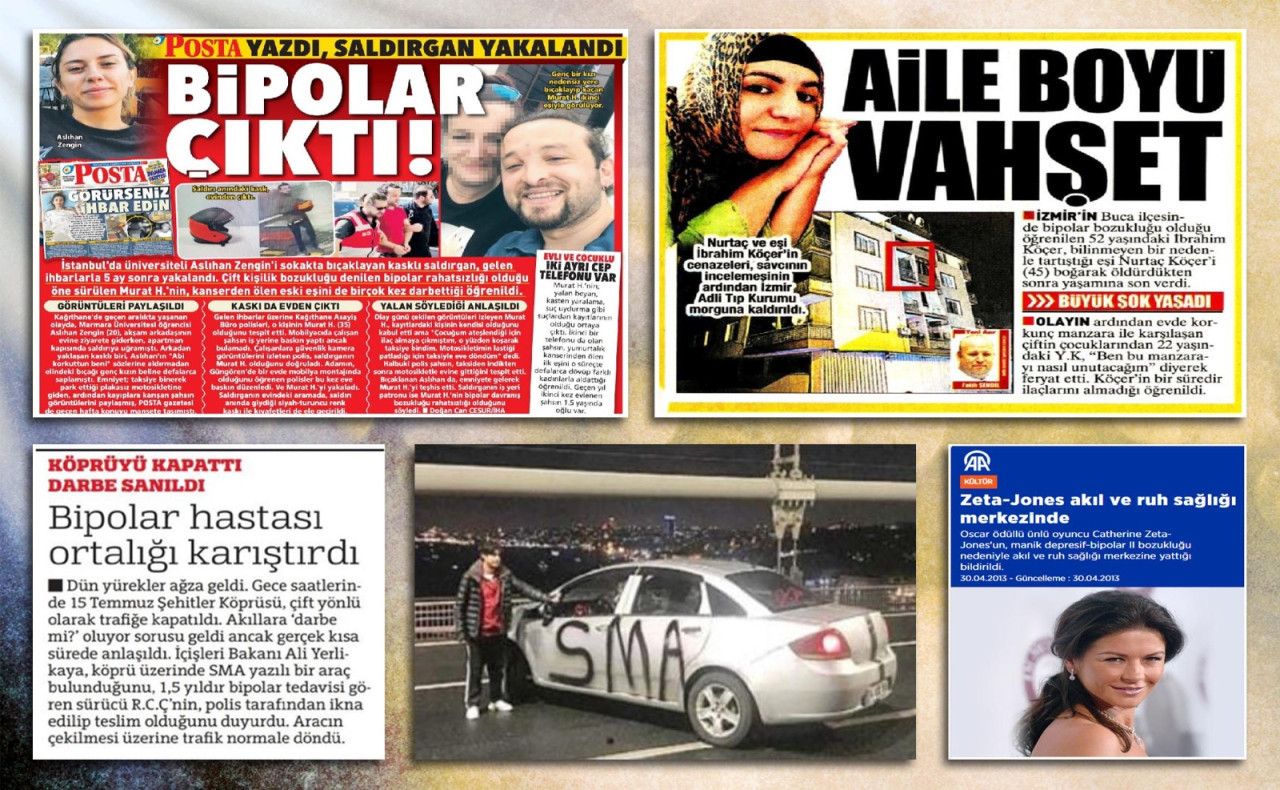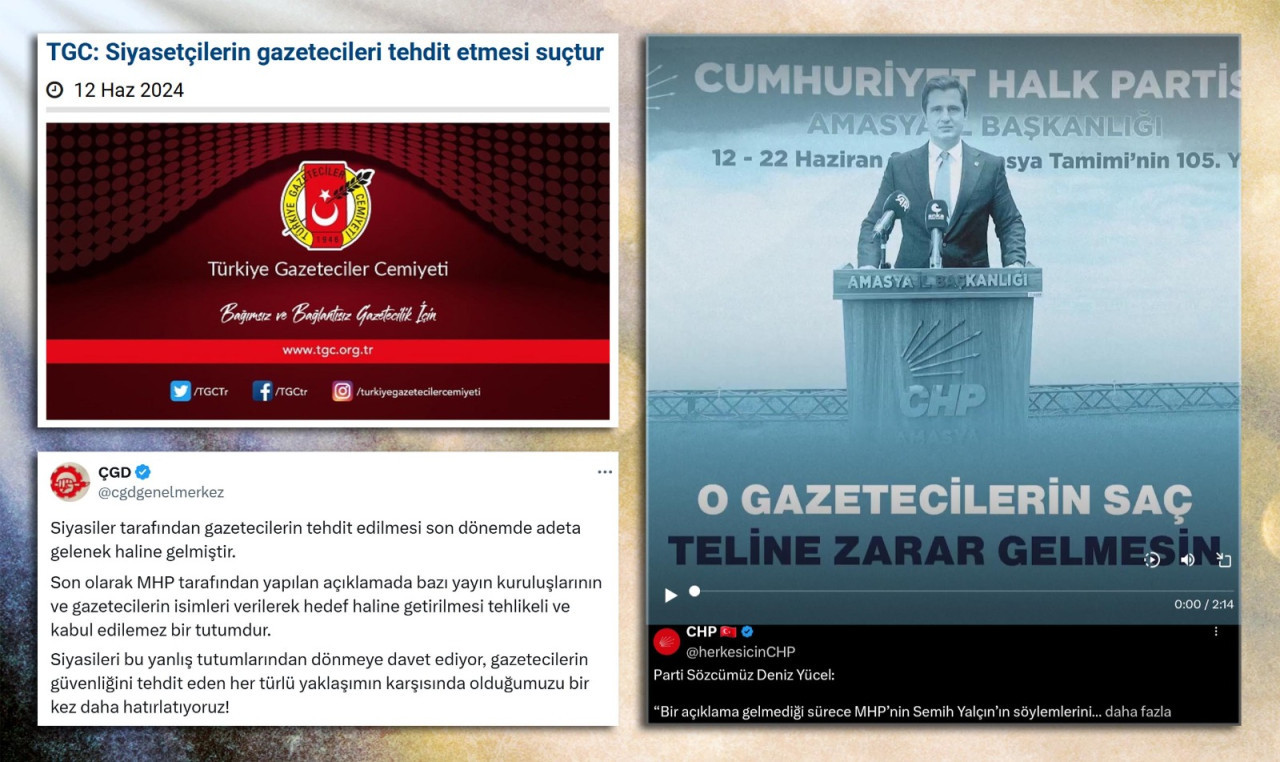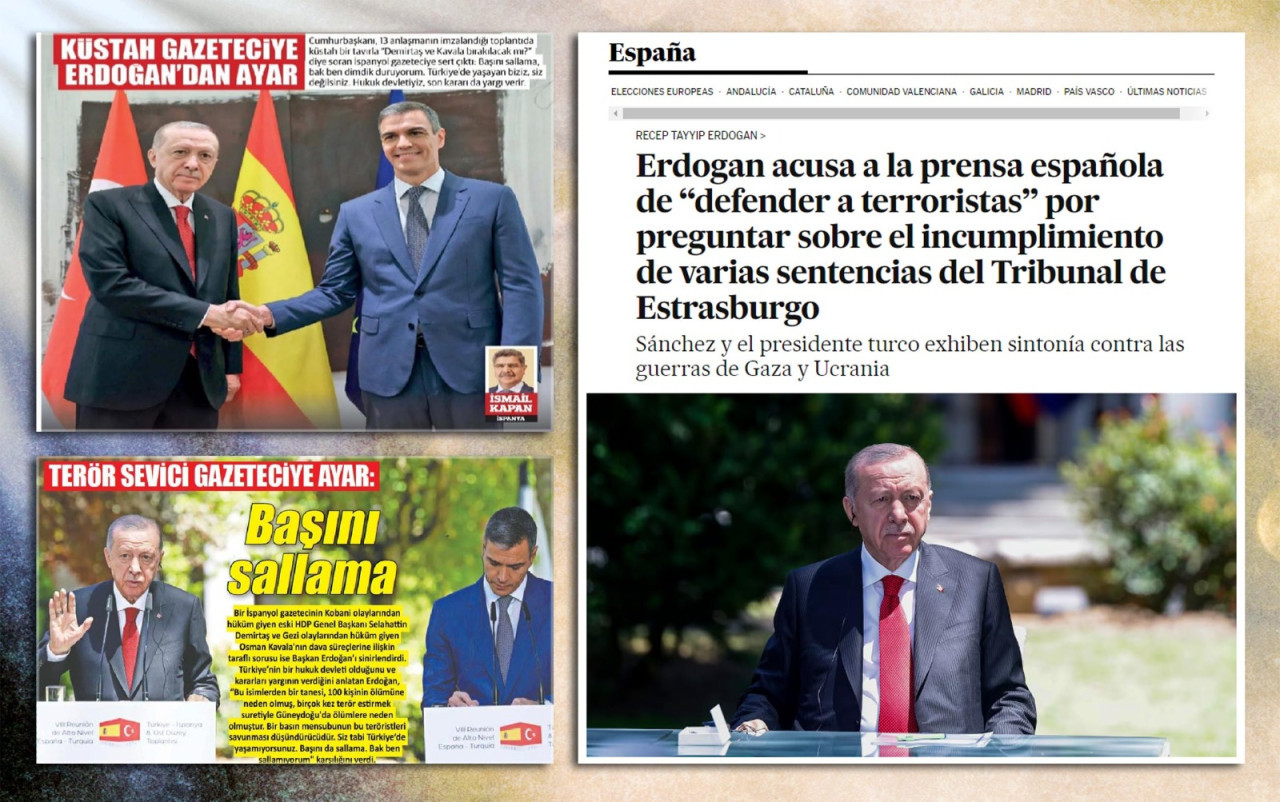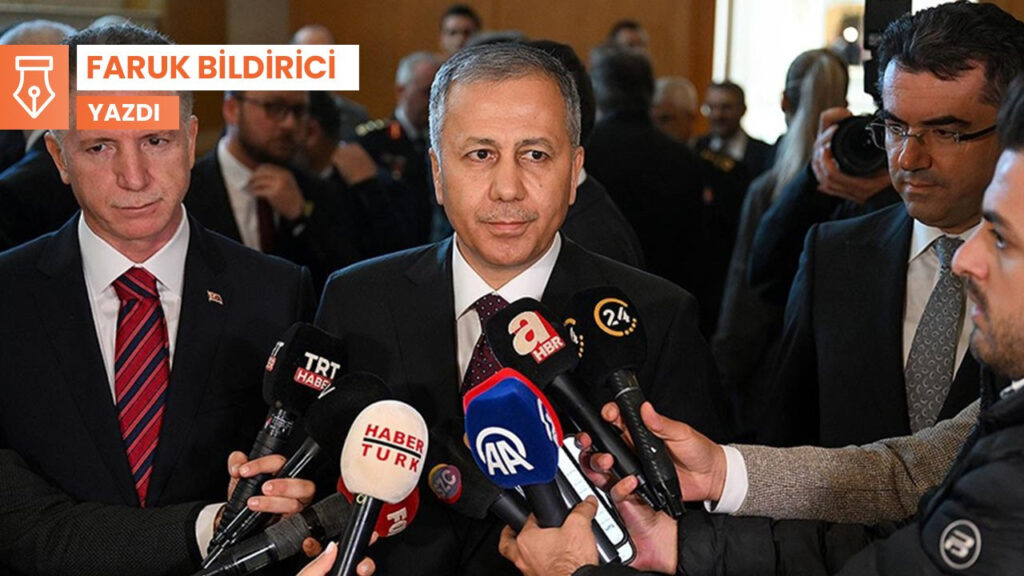Our media almost unanimously portrays bipolar patients as aggressive types, reinforcing negative feelings towards them in society.
News such as “Bipolar man spreads fear,” “Suspect killed man in argument who told him he was a heathen” turns out to have bipolar disorder,” “Bipolar man kills wife and commits suicide,” and “Defendant who stabbed elderly man in the heart claims to have schizophrenia and bipolar disorder” are flooding the media…
Posta also announced the arrest of Murat H., the helmeted attacker who stabbed a young man named Aslhan Zengin on an Istanbul street last week, under the headline “He Turns Out to Have Bipolar Disorder.” The “Family Brutality” news stories in Artı Gerçek, Habertürk, Milliyet, Karar, Korkusuz, Takvim, T24, 10Haber and Yeni Asır said that the man who killed his wife and then committed suicide suffered from “bipolar disorder.”
Finally, Interior Minister Ali Yerlikaya’s statement that the young man who stopped traffic on the bridge with his car was “bipolar” – or rather his blunder – led to the news that “bipolar patient makes waves.” A journalist who participated in CNN Turkey’s “Ring of Fire” also posed as a psychiatrist and made some horrifying comments about the disorder. However, the young activist was reacting to the lack of state support for SMA patients. The issue had nothing to do with his illness.

Additionally, “bipolar disorder” is a treatable mental illness, and it is unfair to associate people with bipolar disorder with violence and to portray them as people who harm others.
Instead of stigmatizing and portraying bipolar patients as violent people, we need to inform society about bipolar disorder and guide bipolar patients to treatment. If necessary, instead of writing “bipolar disorder”, it may be enough to just say “mental disorder”.
Let’s not prejudice people with bipolar disorder and create new enemies. Let’s not forget that famous painter Van Gogh had bipolar disorder, as did actress Catherine Zeta-Jones. Neither of them harmed anyone…
Who did the Turkish Journalists Association blame?
The Turkish Journalists’ Association’s board of directors issued a statement condemning “politicians who have recently targeted and threatened journalists by naming them and their organizations.”
What was interesting about the statement that “it is a crime for politicians to threaten journalists” was that it did not state the real reason why such a denunciation was necessary. It did not say who had “recently” threatened which journalists, nor was there an addressee for the statement. Those who targeted journalists were anonymized, calling them “politicians”…

However, it was MHP vice-chairs Fetih Yıldız and Semi Yalçin who criticized, threatened and targeted journalists and media outlets that day. Fetih Yıldız targeted Gözde Şeker and İbrahim Kahveci, who spoke on Halk TV’s program “Red Line,” calling them “infidels.” Semi Yalçin also slammed and insulted Halk TV, TV 100, and Soşç TV, as well as journalists Barış Yalkadaş, Bahar Fayzan, Ali Kemal Erdem and Osman Sert, who appeared on the programs of these channels, calling them “MHP opposition types.” Yalçin, Hürriyet journalist Abdülkadir He described Servi as a “suicide bomber,” referring to her along with other journalists, calling them “MHP opponents,” and again insulting her.
In fact, on the same day, CHP spokesman Deniz Yucel responded by name, saying, “If the hair of any of the journalists named in the statement is damaged, we will find out about it from Semih Yalçin.” Similarly, contemporary journalists Association He also mentioned the MHP by name and spoke out against threatening language.
The fact that TGC did not name the culprit in their statement, even though the culprit is very obvious, can only mean one thing: they are pretending to condemn MHP but are not offending them…
Spanish journalists also raised their heads
“It’s very unfortunate that members of the press have defended terrorists in this way,” Erdogan said at a press conference in Spain. “Don’t nod, don’t nod. Look, I’m going to continue to work hard,” the ruling media praised him as usual.
“Erdogan’s reaction to insolent journalists” (Turkey), “Coordinating terrorist journalists” (Yeni Akit) “Erdogan’s reaction to Spanish journalists (24TV), Erdogan’s reaction to provocative questions from Spanish journalists: I “Don’t tremble” your head” (Sabah)
They did not even write the question precisely, dismissing it as “about Selahattin Demirtas and Osman Kavala.” In fact, the “Turkish law” was being questioned through Demirtas and Kavala.
“How can Spanish companies trust the legal security of a Turkey that refuses to comply with the ECHR’s decision to release former HDP leader Selahattin Demirtas and philanthropist Osman Kavala?”

Moreover, it was a common question among Spanish journalists in the country, sung on their behalf by El País reporter Carlos E. Cue. In his anger, President Erdogan called all Spanish journalists in the country “terrorists.”
In fact, El Pais published a news story under the headline “Erdogan accuses Spanish press of ‘protecting terrorists’ for asking if Strasbourg court rulings were not followed”. In contrast to our news story, there was no mention at all of the scolding for “nodding”. However, the information that the ECHR decisions have not been implemented highlights that the Turkish legal system is “unreliable”. President Erdogan was reacting through journalism.
Spanish journalists did their duty by asking questions and providing this information in their reports. They did not even take Erdogan’s attitude seriously. It is the attitude of the Turkish ruling media that is the problem. Just as it cannot be proven that a journalist is a crime to ask a politician, no matter what questions he asks. This does not give the politician the right to criticize him.
The “movie heist” cliché just isn’t enough.
Four robbers, working with security guards, broke into Memdu Pasha mansion in Sariyer, Istanbul, at night and stole foreign currency worth 130-150 million liras from four safes. The first question that came to the minds of journalists who saw this news was why such a large amount of foreign currency was kept in the headquarters and not in a bank. Well, if it’s not dirty money, it’s safer in a bank.
However, in many places the incident was reported under the cliché “movie-style robbery” tagline without asking this question. The DHA-sourced story that Soščiu ran on the front page on June 11 as “Robbery at Mehmudu Pasha’s Mansion” did not even include the name of the mansion’s owner.
The IHA news item in Turkiye newspaper “Cinema-like Robbery at the Mansion” listed only “proprietor Umit E.” besides Şoshchu. The Milliyet and Karar news went further, saying that the mansion belonged to NAB Holding. Cumhuriyet’s small news item did not contain this information at all.
The newspapers Takvim and Sabah investigated the matter and found some remarkable information about the robbery: Under the headline “Casa de Papel,” the calendar identified the mansion as owned by Behram Elomi, who belongs to the Iranian construction company NAB Holding and is Reza Zarrab’s brother-in-law.
This information was a key clue as to why there was so much foreign currency in the mansion. Takvim’s information was also published verbatim by our sister newspaper Saba. Reza Zarrab’s information was also published in Hürriyet, but was not published and was placed at the end of the news. Hürriyet published another report about Reza Zarrab just five days later. The next day, a spokesman tried to correct the omission by adding to the information circulating on the Internet, stating that “Zarrab’s sister ran a company from the mansion that was robbed.”
News must be subjected to rigorous editorial questioning and any questions that arise must be pursued and answered. There should be no unanswered questions in the news that is published. Yet our media is still not questioning the source of millions in foreign currency.
The kid who doesn’t get ice cream
“The economic collapse is affecting me. How can I get married? I was going to buy an ice cream but it was 20 lira,” the 10-year-old said, microphoned by reporter Batman Sonsaez.
The interview received a lot of attention in the media and on social media. Newspapers, news sites, Now TV, Halk TV and Sözcü TV made the news. The Sözcü newspaper ran it as a headline. Images of the child Bereket were released publicly, but his name and surname were never revealed. Still, we know for sure that he is well-known in Batman and his surroundings, and at school.
The UNICEF Guide to Reporting on Children for journalists emphasizes that interviews with children must “not expose children to danger or negative images” and that “children’s permission is required. Filming must be in the presence of the child and their legal representative.” These are rules created with the “best interests of the child” in mind…
The interviews with children in Batman were conducted without the permission of legal representatives and without consideration of the negative consequences. No one can guarantee that these conversations, which the government and its supporters will not like, will not have a negative impact on the children’s lives. That is why it is wrong to conduct such interviews. The “best interests of the child” should not have been sacrificed for the sake of ratings or a wider readership.
In one sentence: No ruling media outside of Hurriyet reported on the appointment of Deputy Chief Prosecutor Durdu Özer, who submitted the expert report of the Sinan Ateş murder investigation, as a regular prosecutor at the Regional Administrative Court. Sabah interpreted the payment of a 3,000 lira holiday bonus as if all retirees were given that amount and made news with the headline “42 billion liras deposited in the account”. While all schools were still standing, Sabah announced the news of the graduation ceremony of Hasan Kalyonk University, named after its boss, and Hurriyet announced the news of the distribution of report cards at its owners Demiroren Vocational Training School and TA High School. . Although there was no confidentiality in the “Attack on the MİT Campus” case, the presiding judge did not ask journalist Muesser Yıldız to “write down exactly what the defendant said.”The investigation against Birgün journalist Ismail Ali was launched due to his book titled “Menzilin Kasas”, in which he described the commercial relations and public organizations of the Menzilin faction. Yeni Şafak did not release the DEM party’s statement in response to the news of unknown origin that “Qandil appointed a trustee for Diyarbakir”. He was not given the right to reply. Cumhuriyet acknowledged a person named Ahmet Mahmut Unlu as a source and published a news article under the title “Kubbeli Ahmet’s ‘political’ lobbying: ‘CHP may be given a minister'”. Aksham and Türkye, “850 km. “He carried rabies from far away”, the news reported. He used a photo of a stray dog that had nothing to do with Urfa’s dog, without stating that it was from an archive. Takvim violated the privacy of model Deniz Akkaya and published a photo that exposed the face of her young daughter, who is under state protection. Takvim mocked the news of the death of British doctor Michael Mosley on the Greek island of Symi with a post titled “The Unknown Doctor.”
Regarding criticisms, complaints and suggestions: [email protected]


